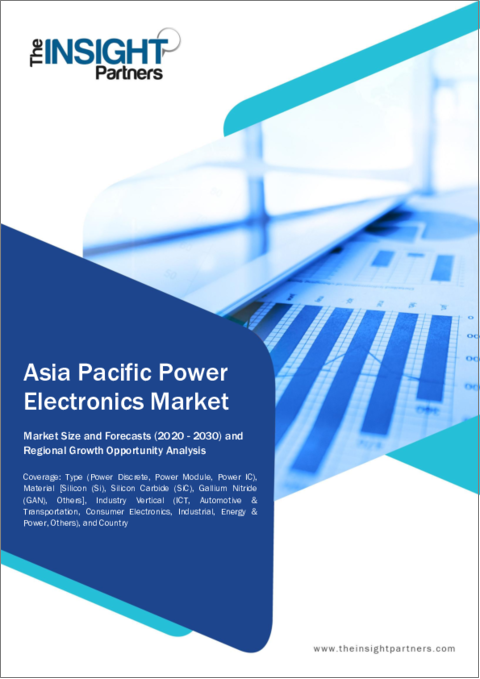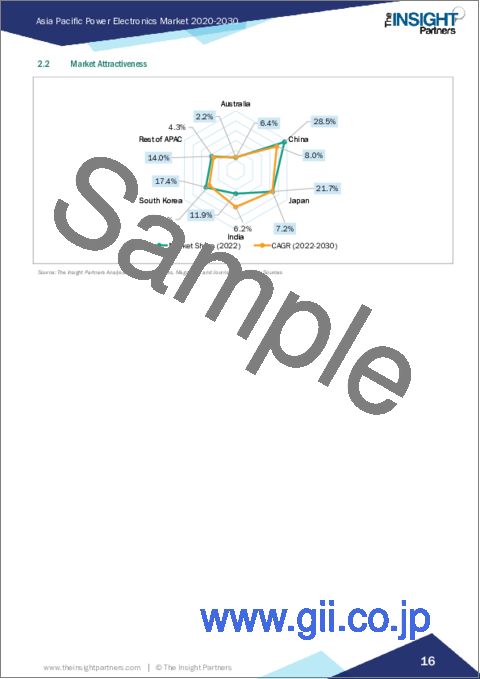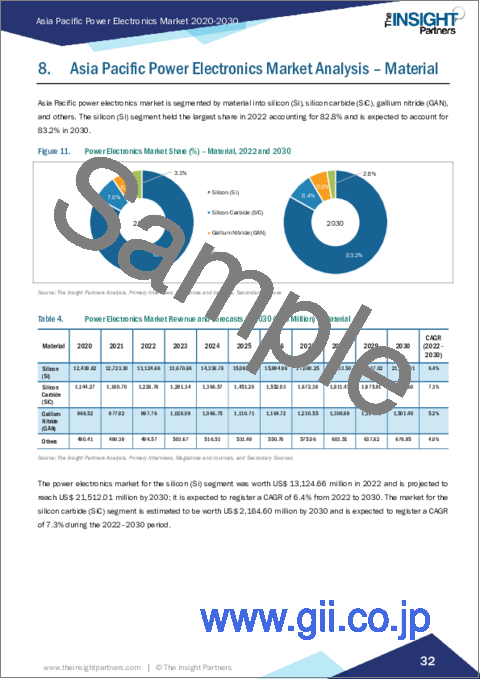|
|
市場調査レポート
商品コード
1562314
アジア太平洋のパワーエレクトロニクス市場の2030年予測-地域別分析-タイプ、材料、業界別Asia Pacific Power Electronics Market Forecast to 2030 - Regional Analysis - by Type, Material, and Industry Vertical |
||||||
|
|||||||
| アジア太平洋のパワーエレクトロニクス市場の2030年予測-地域別分析-タイプ、材料、業界別 |
|
出版日: 2024年07月04日
発行: The Insight Partners
ページ情報: 英文 112 Pages
納期: 即納可能
|
全表示
- 概要
- 図表
- 目次
アジア太平洋のパワーエレクトロニクス市場は、2022年に158億4,577万米ドルと評価され、2030年には258億5,496万米ドルに達すると予測され、2022年から2030年までのCAGRは6.3%を記録すると予測されています。
AIベースのパワーエレクトロニクス需要の増加がアジア太平洋のパワーエレクトロニクス市場を後押し
世界の技術大手は、新技術の研究開発に非常に力を入れています。人工知能(AI)は、パワーエレクトロニクス市場における主要な次世代ソフトウェア技術の1つとして位置づけられています。人工知能(AI)は、特に電力品質サイクルの制御において、パワーエレクトロニクスの運用方法を変革しつつあります。パワーエレクトロニクスにAIを組み込むことで、企業は業務を合理化し、タスクを自動化することができます。例えば、2020年11月、Eneryield ABは、幅広いパワーエレクトロニクスを制御するためのAIベースの予測手法を開発しました。
AIベースのパワーエレクトロニクスは特別な機械学習アルゴリズムと統合されており、膨大な量のデータを用いて数サイクルにわたる電力品質を予測することができます。AIによってパワーエレクトロニクスは、信号測定、電力妨害、リアルタイム監視などの複雑なタスクを処理できるようになります。さらに、パワーエレクトロニクスは、アクティブ・パワー・フィルターなどの機械学習言語ベースのコンポーネントを使用して、継続的な電圧・電流信号を監視し、短時間で電力障害を予測しようとしています。機械学習アルゴリズムは、パワーエレクトロニクスが監視された信号を前処理し、予測値を計算し、その予測値を補償装置に提供するのに適切な時間を提供します。AIベースのパワーエレクトロニクスが提供する大きなメリットは、メーカーがパワーエレクトロニクスにAIを統合することを後押しします。
加えて、AIベースのパワーエレクトロニクスは、メーカーと消費者の双方が機器内の電力供給を制御するのに役立ちます。AIベースのパワーエレクトロニクスに対する需要の増加は、先進的なソリューションを使用・開発するための企業同士の提携を促します。例えば、2023年12月、Unipower ABは、パワーグリッド・アプリケーション向けのAIベースのパワーエレクトロニクスを開発するため、Eneryield ABとの協業を発表しました。この協業は、ユニパワーABがエネリールドABの機械学習ベースの監視モジュールを電力網で使用するのに役立ちます。機械学習ベースの監視モジュールは、ユニパワーABが送電網の故障を予測するのに役立ち、送電網の安定性と供給セキュリティの向上につながります。このように、AIベースのパワーエレクトロニクスに対する需要の増加は、予測期間中にパワーエレクトロニクス市場のプレーヤーに有利な機会を創出すると予想されます。
アジア太平洋のパワーエレクトロニクス市場概要
アジア太平洋地域は、予測期間中に最も高いCAGRでパワーエレクトロニクス市場をリードすると予想されます。民生用電子機器の存在感が大きいことが、アジア太平洋での市場拡大に結びついています。
発電需要の高まりや、アジア太平洋のいくつかの国々で発電を支援する政府の試みが、発電コストを押し上げています。再生可能エネルギーのインフラ開拓は、市場全体を牽引する重要な要因です。さらに、新興国市場、特に中国とインドでは人口が拡大しており、通信インフラの配備が増加しているため、予測期間中、同地域のパワーエレクトロニクス市場の拡大に拍車がかかると予想されます。アジア太平洋地域には、ルネサスエレクトロニクス、三菱電機、富士電機、東芝などの老舗パワーエレクトロニクスメーカーが存在し、市場の成長を後押ししています。さらに、BYO、Huawei、CRRC、Sungrowといった中国企業の発展は、中国国内のパワーエレクトロニクス分野を強化しています。これらすべての要因がアジア太平洋のパワーエレクトロニクス市場の成長を促進しています。
アジア太平洋のパワーエレクトロニクス市場の収益と2030年までの予測(金額)
アジア太平洋のパワーエレクトロニクス市場セグメンテーション
アジア太平洋のパワーエレクトロニクス市場は、タイプ、材料、業界別、国別に分類されます。
タイプ別では、アジア太平洋地域のパワーエレクトロニクス市場はパワーディスクリート、パワーモジュール、パワーICに分類されます。パワーモジュールは2022年に最大の市場シェアを占めました。
材料別では、アジア太平洋のパワーエレクトロニクス市場はシリコン(SI)、炭化シリコン(SIC)、窒化ガリウム(GAN)、その他に分類されます。2022年には炭化ケイ素(SIC)セグメントが最大の市場シェアを占めました。
業界別では、アジア太平洋のパワーエレクトロニクス市場は、ICT、自動車・輸送、民生用エレクトロニクス、産業、エネルギー・電力、その他に区分されます。民生用電子機器セグメントが2022年に最大の市場シェアを占めました。
国別では、アジア太平洋のパワーエレクトロニクス市場は、オーストラリア、中国、日本、インド、韓国、その他アジア太平洋地域に区分されます。2022年のアジア太平洋のパワーエレクトロニクス市場シェアは中国が独占。
Vishay Intertechnology Inc、Toshiba Electronic Devices &Storage Corp、Littelfuse, Inc、Renesas Electronics Corp、ROHM Co Lt、Fuji Electric Co Ltd、Mitsubishi Electric Corp、STMicroelectronics NV、Semiconductor Components Industries, L.L.C.(オン・セミコンダクター)、Infineon Technologies AGは、アジア太平洋のパワーエレクトロニクス市場で事業を展開する主要企業です。
目次
第1章 イントロダクション
- 洞察パートナーズ調査レポートのガイダンス
- 市場セグメンテーション
第2章 エグゼクティブサマリー
- 主要洞察
- 市場の魅力
第3章 調査手法
- 調査範囲
- 2次調査
- 1次調査
第4章 パワーエレクトロニクス市場情勢
- PEST分析
- エコシステム分析
- バリューチェーンのベンダー一覧
第5章 アジア太平洋のパワーエレクトロニクス市場:主要産業力学
- 促進要因
- 電気自動車におけるSiCベースのパワーエレクトロニクス統合の増加
- 電力効率とエネルギー効率の高いデバイスに対する需要の高まり
- 市場抑制要因
- 製品設計と統合プロセスに伴う複雑さ
- 市場機会
- AIベースのパワーエレクトロニクスに対する需要の増加
- 今後の動向
- スマートグリッド技術の採用拡大
- 促進要因と抑制要因の影響
第6章 パワーエレクトロニクス市場:アジア太平洋市場分析
- パワーエレクトロニクス市場の収益、2022年~2030年
- パワーエレクトロニクス市場の予測と分析
第7章 アジア太平洋地域のパワーエレクトロニクス市場分析:タイプ別
- パワーディスクリート
- パワーディスクリート市場の収益と2030年までの予測
- パワーモジュール
- パワーモジュールの概要
- パワーモジュール市場の収益と2030年までの予測
- パワーIC
- パワーIC市場の収益と2030年までの予測
第8章 アジア太平洋のパワーエレクトロニクス市場分析:材料別
- シリコン(Si)
- シリコン(Si)市場の収益と2030年までの予測
- 炭化ケイ素(SiC)
- 炭化ケイ素(SiC)市場の収益と2030年までの予測
- 窒化ガリウム(GAN)
- 窒化ガリウムの概要
- 窒化ガリウム(GAN)市場の収益と2030年までの予測
- その他
- その他の概要
- その他市場の収益と2030年までの予測
第9章 アジア太平洋のパワーエレクトロニクス市場分析-業界別
- 情報通信技術(ICT)
- ICT市場の収益と2030年までの予測
- 自動車・運輸
- 自動車・輸送機器市場の収益と2030年までの予測
- コンシューマー・エレクトロニクス
- 家電市場の収益と2030年までの予測
- 産業用機器
- 産業用機器市場の収益と2030年までの予測
- エネルギー・電力
- エネルギー・電力市場の収益と2030年までの予測
- その他
- その他の概要
- その他市場の収益と2030年までの予測
第10章 アジア太平洋のパワーエレクトロニクス市場:国別分析
- オーストラリア
- 中国
- 日本
- インド
- 韓国
- その他アジア太平洋
第11章 パワーエレクトロニクス市場:COVID-19パンデミックの影響
- COVID-19前後の影響
第12章 業界情勢
- 市場イニシアティブ
- 新製品開発
- 合併と買収
第13章 企業プロファイル
- Infineon Technologies AG
- Semiconductor Components Industries, L.L.C.(On Semiconductor)
- STMicroelectronics NV
- Mitsubishi Electric Corp
- Fuji Electric Co Ltd
- ROHM Co Ltd
- Renesas Electronics Corp
- Littelfuse, Inc
- Toshiba Electronic Devices & Storage Corp
- Vishay Intertechnology Inc
第14章 付録
List Of Tables
- Table 1. Power Electronics Market Segmentation
- Table 2. Power Electronics Market Revenue and Forecasts to 2030 (US$ Million)
- Table 3. Power Electronics Market Revenue and Forecasts to 2030 (US$ Million) - Type
- Table 4. Power Electronics Market Revenue and Forecasts to 2030 (US$ Million) - Material
- Table 5. Power Electronics Market Revenue and Forecasts to 2030 (US$ Million) - Industry Vertical
- Table 6. Asia Pacific Power Electronics Market, by Country - Revenue and Forecast to 2030 (USD Million)
- Table 7. Australia Power Electronics Market Revenue and Forecasts to 2030 (US$ Mn) - By Type
- Table 8. Australia Power Electronics Market Revenue and Forecasts to 2030 (US$ Mn) - By Material
- Table 9. Australia Power Electronics Market Revenue and Forecasts to 2030 (US$ Mn) - By Industry Vertical
- Table 10. China Power Electronics Market Revenue and Forecasts to 2030 (US$ Mn) - By Type
- Table 11. China Power Electronics Market Revenue and Forecasts to 2030 (US$ Mn) - By Material
- Table 12. China Power Electronics Market Revenue and Forecasts to 2030 (US$ Mn) - By Industry Vertical
- Table 13. Japan Power Electronics Market Revenue and Forecasts to 2030 (US$ Mn) - By Type
- Table 14. Japan Power Electronics Market Revenue and Forecasts to 2030 (US$ Mn) - By Material
- Table 15. Japan Power Electronics Market Revenue and Forecasts to 2030 (US$ Mn) - By Industry Vertical
- Table 16. India Power Electronics Market Revenue and Forecasts to 2030 (US$ Mn) - By Type
- Table 17. India Power Electronics Market Revenue and Forecasts to 2030 (US$ Mn) - By Material
- Table 18. India Power Electronics Market Revenue and Forecasts to 2030 (US$ Mn) - By Industry Vertical
- Table 19. South Korea Power Electronics Market Revenue and Forecasts to 2030 (US$ Mn) - By Type
- Table 20. South Korea Power Electronics Market Revenue and Forecasts to 2030 (US$ Mn) - By Material
- Table 21. South Korea Power Electronics Market Revenue and Forecasts to 2030 (US$ Mn) - By Industry Vertical
- Table 22. Rest of Asia Pacific Power Electronics Market Revenue and Forecasts to 2030 (US$ Mn) - By Type
- Table 23. Rest of Asia Pacific Power Electronics Market Revenue and Forecasts to 2030 (US$ Mn) - By Material
- Table 24. Rest of Asia Pacific Power Electronics Market Revenue and Forecasts to 2030 (US$ Mn) - By Industry Vertical
- Table 25. List of Abbreviation
List Of Figures
- Figure 1. Power Electronics Market Segmentation, By Country
- Figure 2. PEST Analysis
- Figure 3. Ecosystem: Power Electronics Market
- Figure 4. Power Electronics Market - Key Industry Dynamics
- Figure 5. Impact Analysis of Drivers and Restraints
- Figure 6. Power Electronics Market Revenue (US$ Million), 2022 & 2030
- Figure 7. Power Electronics Market Share (%) - Type, 2022 and 2030
- Figure 8. Power Discrete Market Revenue and Forecasts to 2030 (US$ Million)
- Figure 9. Power Module Market Revenue and Forecasts to 2030 (US$ Million)
- Figure 10. Power IC Market Revenue and Forecasts to 2030 (US$ Million)
- Figure 11. Power Electronics Market Share (%) - Material, 2022 and 2030
- Figure 12. Silicon (Si) Market Revenue and Forecasts to 2030 (US$ Million)
- Figure 13. Silicon Carbide (SiC) Market Revenue and Forecasts to 2030 (US$ Million)
- Figure 14. Gallium Nitride (GAN) Market Revenue and Forecasts to 2030 (US$ Million)
- Figure 15. Others Market Revenue and Forecasts to 2030 (US$ Million)
- Figure 16. Power Electronics Market Share (%) - Industry Vertical, 2022 and 2030
- Figure 17. ICT Market Revenue and Forecasts to 2030 (US$ Million)
- Figure 18. Automotive & Transportation Market Revenue and Forecasts to 2030 (US$ Million)
- Figure 19. Consumer Electronics Market Revenue and Forecasts to 2030 (US$ Million)
- Figure 20. Industrial Market Revenue and Forecasts to 2030 (US$ Million)
- Figure 21. Energy & Power Market Revenue and Forecasts to 2030 (US$ Million)
- Figure 22. Others Market Revenue and Forecasts to 2030 (US$ Million)
- Figure 23. Asia Pacific Power Electronics Market, by Countries - Revenue (2022) (US$ Million)
- Figure 24. Asia Pacific Power Electronics Market Breakdown by Key Countries, 2022 And 2030 (%)
- Figure 25. Australia Power Electronics Market Revenue and Forecasts to 2030 (US$ Mn)
- Figure 26. China Power Electronics Market Revenue and Forecasts to 2030 (US$ Mn)
- Figure 27. Japan Power Electronics Market Revenue and Forecasts to 2030 (US$ Mn)
- Figure 28. India Power Electronics Market Revenue and Forecasts to 2030 (US$ Mn)
- Figure 29. South Korea Power Electronics Market Revenue and Forecasts to 2030 (US$ Mn)
- Figure 30. Rest of Asia Pacific Power Electronics Market Revenue and Forecasts to 2030 (US$ Mn)
The Asia Pacific power electronics market was valued at US$ 15,845.77 million in 2022 and is expected to reach US$ 25,854.96 million by 2030; it is estimated to record a CAGR of 6.3% from 2022 to 2030.
Increasing Demand for AI-based Power Electronics Fuels Asia Pacific Power Electronics Market
Technological giants worldwide are highly focused on research and development of new technologies. Artificial intelligence (AI) is positioned as one of the major next-gen software technologies in the power electronics market. Artificial intelligence (AI) is transforming the way power electronics operate, especially in controlling the power quality cycle. Incorporating AI into power electronics helps businesses to streamline operations and automate tasks. For instance, in November 2020, Eneryield AB created an AI-based predictive method to control a wide range of power electronics.
AI-based power electronics are integrated with special machine-learning algorithms that allow huge amounts of data to be used to forecast the power quality over several cycles. AI allows power electronics to handle complex tasks such as signal measurement, power disturbance, and real-time monitoring. Further, power electronics use machine learning language-based components such as active power filters for monitoring the ongoing voltage and current signal attempts for predicting the power disturbance within a short time. The machine learning algorithm provides appropriate time for power electronics to pre-process the monitored signal, compute the prediction, and provide the prediction to the compensation device-which can then inject the opposite harmonics and interharmonics signal to mitigate the disturbance actively. Significant benefits offered by AI-based power electronics encourage manufacturers to integrate AI in power electronics.
In addition, AI-based power electronics help both manufacturers and consumers to control the electricity supply in the devices. Increasing demand for AI-based power electronics encourages companies to partner with each other to use and develop advanced solutions. For instance, in December 2023, Unipower AB announced a collaboration with Eneryield AB to develop AI-based power electronics for power grid applications. This collaboration helps Unipower AB use Eneryield AB's machine learning-based surveillance module in the power grids. The machine learning-based surveillance module helps Unipower AB predict faults in power grids, which can lead to better grid stability and supply security. Thus, the increasing demand for AI-based power electronics is anticipated to create lucrative opportunities for the power electronics market players during the forecast period.
Asia Pacific Power Electronics Market Overview
Asia Pacific is expected to lead the power electronics market with the highest CAGR over the forecast period. The significant presence of consumer electronics can be linked to the market's expansion in Asia Pacific.
The rising demand for power generation, as well as government attempts to support power generation in several Asia Pacific countries, are boosting the cost of power generation. Renewable energy infrastructure development is a critical factor driving the overall market. Moreover, the expanding population in developing countries, particularly China and India, which is increasing the deployment of communication infrastructure, is expected to fuel the market expansion for power electronics in the region during the forecast period. The presence of well-established power electronics market players such as Renesas Electronics Corporation, Mitsubishi Electric Corporation, Fuji Electric Co., and TOSHIBA CORPORATION in Asia Pacific boosts the market growth. Furthermore, the development of Chinese firms such as BYO, Huawei, CRRC, and Sungrow is strengthening the domestic power electronics sector in China. All these factors are driving the growth of the Asia Pacific power electronics market.
Asia Pacific Power Electronics Market Revenue and Forecast to 2030 (US$ Million)
Asia Pacific Power Electronics Market Segmentation
The Asia Pacific power electronics market is categorized into type, material, industry vertical, and country.
Based on type, the Asia Pacific power electronics market is categorized into power discrete, power module, and power IC. The power module segment held the largest market share in 2022.
In terms of material, the Asia Pacific power electronics market is categorized into Silicon (SI), Silicon Carbide (SIC), Gallium Nitride (GAN), and others. The Silicon Carbide (SIC) segment held the largest market share in 2022.
By industry vertical, the Asia Pacific power electronics market is segmented into ICT, automotive & transportation, consumer electronics, industrial, energy & power, and others. The consumer electronics segment held the largest market share in 2022.
By country, the Asia Pacific power electronics market is segmented into Australia, China, Japan, India, South Korea, and the Rest of Asia Pacific. China dominated the Asia Pacific power electronics market share in 2022.
Vishay Intertechnology Inc; Toshiba Electronic Devices & Storage Corp; Littelfuse, Inc; Renesas Electronics Corp; ROHM Co Lt; Fuji Electric Co Ltd; Mitsubishi Electric Corp; STMicroelectronics NV; Semiconductor Components Industries, L.L.C. (On Semiconductor); and Infineon Technologies AG are some of the leading companies operating in the Asia Pacific power electronics market.
Table Of Contents
1. Introductions
- 1.1 The Insight Partners Research Report Guidance
- 1.2 Market Segmentation
2. Executive Summary
- 2.1 Key Insights
- 2.2 Market Attractiveness
3. Research Methodology
- 3.1 Coverage
- 3.2 Secondary Research
- 3.3 Primary Research
4. Power Electronics Market Landscape
- 4.1 Overview
- 4.2 PEST Analysis
- 4.3 Ecosystem Analysis
- 4.3.1 List of Vendors in Value Chain:
5. Asia Pacific Power Electronics Market - Key Industry Dynamics
- 5.1 Drivers
- 5.1.1 Increasing Integration of SiC-based Power Electronics in Electric Vehicles
- 5.1.2 Rising Demand for Power-efficient and High-energy Devices
- 5.2 Market Restraints
- 5.2.1 Complexities Associated with Product Design and Integration Process
- 5.3 Market Opportunities
- 5.3.1 Increasing Demand for AI-based Power Electronics
- 5.4 Future Trends
- 5.4.1 Growing Adoption of Smart Grid Technology
- 5.5 Impact of Drivers and Restraints:
6. Power Electronics Market - Asia Pacific Market Analysis
- 6.1 Power Electronics Market Revenue (US$ Million), 2022 - 2030
- 6.2 Power Electronics Market Forecast and Analysis
7. Asia Pacific Power Electronics Market Analysis - Type
- 7.1 Power Discrete
- 7.1.1 Overview
- 7.1.2 Power Discrete Market Revenue and Forecasts to 2030 (US$ Million)
- 7.2 Power Module
- 7.2.1 Overview
- 7.2.2 Power Module Market Revenue and Forecasts to 2030 (US$ Million)
- 7.3 Power IC
- 7.3.1 Overview
- 7.3.2 Power IC Market Revenue and Forecasts to 2030 (US$ Million)
8. Asia Pacific Power Electronics Market Analysis - Material
- 8.1 Silicon (Si)
- 8.1.1 Overview
- 8.1.2 Silicon (Si) Market Revenue and Forecasts to 2030 (US$ Million)
- 8.2 Silicon Carbide (SiC)
- 8.2.1 Overview
- 8.2.2 Silicon Carbide (SiC) Market Revenue and Forecasts to 2030 (US$ Million)
- 8.3 Gallium Nitride (GAN)
- 8.3.1 Overview
- 8.3.2 Gallium Nitride (GAN) Market Revenue and Forecasts to 2030 (US$ Million)
- 8.4 Others
- 8.4.1 Overview
- 8.4.2 Others Market Revenue and Forecasts to 2030 (US$ Million)
9. Asia Pacific Power Electronics Market Analysis - Industry Vertical
- 9.1 ICT
- 9.1.1 Overview
- 9.1.2 ICT Market Revenue and Forecasts to 2030 (US$ Million)
- 9.2 Automotive & Transportation
- 9.2.1 Overview
- 9.2.2 Automotive & Transportation Market Revenue and Forecasts to 2030 (US$ Million)
- 9.3 Consumer Electronics
- 9.3.1 Overview
- 9.3.2 Consumer Electronics Market Revenue and Forecasts to 2030 (US$ Million)
- 9.4 Industrial
- 9.4.1 Overview
- 9.4.2 Industrial Market Revenue and Forecasts to 2030 (US$ Million)
- 9.5 Energy & Power
- 9.5.1 Overview
- 9.5.2 Energy & Power Market Revenue and Forecasts to 2030 (US$ Million)
- 9.6 Others
- 9.6.1 Overview
- 9.6.2 Others Market Revenue and Forecasts to 2030 (US$ Million)
10. Asia Pacific Power Electronics Market - Country Analysis
- 10.1 Asia Pacific Power Electronics Market
- 10.1.1 Overview
- 10.1.2 Power Electronics Market Breakdown by Countries
- 10.1.2.1 Australia Power Electronics Market Revenue and Forecasts to 2030 (US$ Mn)
- 10.1.2.1.1 Australia Power Electronics Market Breakdown by Type
- 10.1.2.1.2 Australia Power Electronics Market Breakdown by Material
- 10.1.2.1.3 Australia Power Electronics Market Breakdown by Industry Vertical
- 10.1.2.2 China Power Electronics Market Revenue and Forecasts to 2030 (US$ Mn)
- 10.1.2.2.1 China Power Electronics Market Breakdown by Type
- 10.1.2.2.2 China Power Electronics Market Breakdown by Material
- 10.1.2.2.3 China Power Electronics Market Breakdown by Industry Vertical
- 10.1.2.3 Japan Power Electronics Market Revenue and Forecasts to 2030 (US$ Mn)
- 10.1.2.3.1 Japan Power Electronics Market Breakdown by Type
- 10.1.2.3.2 Japan Power Electronics Market Breakdown by Material
- 10.1.2.3.3 Japan Power Electronics Market Breakdown by Industry Vertical
- 10.1.2.4 India Power Electronics Market Revenue and Forecasts to 2030 (US$ Mn)
- 10.1.2.4.1 India Power Electronics Market Breakdown by Type
- 10.1.2.4.2 India Power Electronics Market Breakdown by Material
- 10.1.2.4.3 India Power Electronics Market Breakdown by Industry Vertical
- 10.1.2.5 South Korea Power Electronics Market Revenue and Forecasts to 2030 (US$ Mn)
- 10.1.2.5.1 South Korea Power Electronics Market Breakdown by Type
- 10.1.2.5.2 South Korea Power Electronics Market Breakdown by Material
- 10.1.2.5.3 South Korea Power Electronics Market Breakdown by Industry Vertical
- 10.1.2.6 Rest of Asia Pacific Power Electronics Market Revenue and Forecasts to 2030 (US$ Mn)
- 10.1.2.6.1 Rest of Asia Pacific Power Electronics Market Breakdown by Type
- 10.1.2.6.2 Rest of Asia Pacific Power Electronics Market Breakdown by Material
- 10.1.2.6.3 Rest of Asia Pacific Power Electronics Market Breakdown by Industry Vertical
- 10.1.2.1 Australia Power Electronics Market Revenue and Forecasts to 2030 (US$ Mn)
11. Power Electronics Market - Impact of COVID-19 Pandemic
- 11.1 Pre & Post Covid-19 Impact
12. Industry Landscape
- 12.1 Overview
- 12.2 Market Initiative
- 12.3 New Product Development
- 12.4 Merger and Acquisition
13. Company Profiles
- 13.1 Infineon Technologies AG
- 13.1.1 Key Facts
- 13.1.2 Business Description
- 13.1.3 Products and Services
- 13.1.4 Financial Overview
- 13.1.5 SWOT Analysis
- 13.1.6 Key Developments
- 13.2 Semiconductor Components Industries, L.L.C. (On Semiconductor)
- 13.2.1 Key Facts
- 13.2.2 Business Description
- 13.2.3 Products and Services
- 13.2.4 Financial Overview
- 13.2.5 SWOT Analysis
- 13.2.6 Key Developments
- 13.3 STMicroelectronics NV
- 13.3.1 Key Facts
- 13.3.2 Business Description
- 13.3.3 Products and Services
- 13.3.4 Financial Overview
- 13.3.5 SWOT Analysis
- 13.3.6 Key Developments
- 13.4 Mitsubishi Electric Corp
- 13.4.1 Key Facts
- 13.4.2 Business Description
- 13.4.3 Products and Services
- 13.4.4 Financial Overview
- 13.4.5 SWOT Analysis
- 13.4.6 Key Developments
- 13.5 Fuji Electric Co Ltd
- 13.5.1 Key Facts
- 13.5.2 Business Description
- 13.5.3 Products and Services
- 13.5.4 Financial Overview
- 13.5.5 SWOT Analysis
- 13.5.6 Key Developments
- 13.6 ROHM Co Ltd
- 13.6.1 Key Facts
- 13.6.2 Business Description
- 13.6.3 Products and Services
- 13.6.4 Financial Overview
- 13.6.5 SWOT Analysis
- 13.6.6 Key Developments
- 13.7 Renesas Electronics Corp
- 13.7.1 Key Facts
- 13.7.2 Business Description
- 13.7.3 Products and Services
- 13.7.4 Financial Overview
- 13.7.5 SWOT Analysis
- 13.7.6 Key Developments
- 13.8 Littelfuse, Inc
- 13.8.1 Key Facts
- 13.8.2 Business Description
- 13.8.3 Products and Services
- 13.8.4 Financial Overview
- 13.8.5 SWOT Analysis
- 13.8.6 Key Developments
- 13.9 Toshiba Electronic Devices & Storage Corp
- 13.9.1 Key Facts
- 13.9.2 Business Description
- 13.9.3 Products and Services
- 13.9.4 Financial Overview
- 13.9.5 SWOT Analysis
- 13.9.6 Key Developments
- 13.10 Vishay Intertechnology Inc
- 13.10.1 Key Facts
- 13.10.2 Business Description
- 13.10.3 Products and Services
- 13.10.4 Financial Overview
- 13.10.5 SWOT Analysis
- 13.10.6 Key Developments
14. Appendix
- 14.1 Word Index






